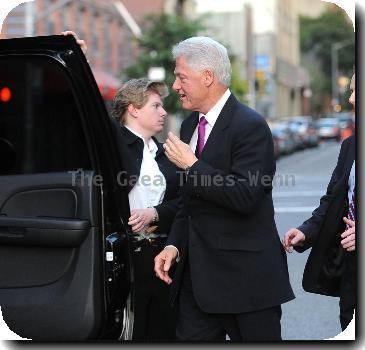2009 was a trying political year for Obama, but Dems hope GOP schisms will help them in 2010
By Charles Babington, APThursday, December 10, 2009
2009 was trying for Obama; Dems fret over 2010
WASHINGTON — Even if President Barack Obama’s lofty ratings were bound to recede, 2009 has been a politically bruising year for Democrats, who now approach 2010 with deep anxieties.
They lost both governors’ races and their party’s activists are split over Afghanistan. Voters hold Democrats, as the party in power, accountable for high unemployment and soaring deficits.
Obama and Congress’s Democratic leaders are spending substantial political capital as they struggle to enact their landmark health care proposals, despite holding solid House and Senate majorities.
The party’s troubles would be starker but for one silver lining: Republicans appear even more dysfunctional. Discord over ideological purity is splitting them, and they seem far from settling on party priorities, let alone a leader.
In fact, voter discontent with incumbents of every stripe could be a dominant theme in 2010. It’s hard to predict how such sentiments might affect the elections of all 435 House members, one-third of the Senate and 37 governors.
Recent polls show that large margins of Americans disapprove of the way congressional Democrats are handling their jobs. Republicans fare even worse. In a Quinnipiac University Poll, 58 percent of voters disapproved of their performance and 31 percent approved.
A different poll gave Democrats a clear edge as the party that Americans most trust to handle the nation’s problems.
Obama entered 2009 with dizzying success. The winner of a historic election, he headed a party enjoying some of the biggest congressional majorities in decades.
But he immediately faced extraordinary challenges: An economy teetering on the edge of a depression, and a war-weary electorate eager to withdraw from Iraq and reluctant to send more troops to Afghanistan.
Obama fought hard to win a $787 billion economic stimulus bill, and later threw himself into the bid to overhaul the health care system.
Republican lawmakers, almost to a person, have fought him at every step. They relentlessly criticize the stimulus as doing too little to save U.S. jobs, and their fierce attacks on his health care proposals have taken a toll.
A November AP-GfK poll found that nearly half of those questioned opposed the Obama-backed health care proposals in Congress, while only about one-third supported them.
Curiously, the same poll showed a slightly higher number of people supporting Obama’s handling of health care than opposing. It underscored the declining but still substantial amount of good will the president enjoys from his campaign, election and inauguration.
Obama’s overall approval rating is 54 percent, down from the heady 67 percent he scored in February, according to the AP-GfK poll. Many people seem to like Obama personally while taking a dimmer view of his approach to top issues. The November AP-GfK poll found more people disapproving than approving of his handling of unemployment, taxes, the deficit, immigration and Afghanistan.
Even if Obama’s personal popularity extends into next year, many Democratic candidates fear it will do them little good in the November elections. They saw troubling hints in 2009.
This year’s handful of elections — including those in which Democrats failed to hold the governor’s offices in New Jersey and Virginia — showed that legions of young, liberal and minority voters who swarmed to the polls to help elect Obama are far less motivated when he’s not on the ballot.
This worries congressional Democrats, who need their base to turn out to counter fired-up conservatives. Forty-nine House Democrats hail from districts that Obama lost last year, while 35 Republicans are from districts he won. Moreover, the president’s party usually loses congressional seats in his first midterm election.
Republicans, who must pick up 41 House seats to control the chamber, hope for a replay of 1994. That’s when President Bill Clinton saw the GOP gain 52 seats to take over the House for the first time in decades.
But Republicans have their own serious problems, starting with renewed tensions between hardcore conservatives and moderates more willing to compromise. Open warfare between these groups embarrassed the GOP in a special House election in upstate New York, when it lost a long-held Republican seat after conservatives rejected the party’s moderate nominee and backed a third-party candidate.
Unrepentant conservatives asked the Republican National Committee to embrace an ideological purity test that would withhold campaign funds from candidates who fail to embrace key conservative positions. Many party leaders have rejected the idea, but they still worry that intraparty schisms will cost Republicans some races they could have won.
Rep. Jack Kingston, R-Ga., says the GOP can overcome such quarrels and allay the concerns of voters who currently hold Republicans in lower regard than Democrats. But Republican candidates must show they really intend to cut deficit spending and rein in the government, he said, and not just pay lip service as they did under President George W. Bush.
“We have got to go out there and show we do have an agenda, we did learn our lesson, we apologize for our overspending and our wayward path,” Kingston said. “The American people actually like the counterbalance of two parties fighting.”
In the 100-member Senate, Democrats and their two independent allies hold 60 seats, the minimum needed to stave off bill-killing filibusters. Republican retirements give Democrats hopes of picking up open seats in Ohio, Missouri and perhaps other states next year.
But Democratic incumbents are in early trouble in Connecticut, Nevada and Arkansas, and some party stalwarts expect a net loss in seats.
With Obama absent from the ticket, and liberals demoralized over health care compromises and the Afghanistan troop surge, Democratic candidates feel much more vulnerable than they did a year ago.
Tags: Afghanistan, Asia, Barack Obama, Bill Clinton, Central Asia, Government Regulations, Health Care Reform, House Elections, Industry Regulation, North America, Political Approval Ratings, Political Issues, Political Organizations, Political Parties, State Elections, United States, Washington

